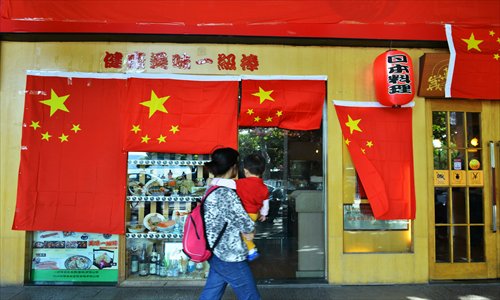Calm after the storm

Tensions have escalated recently between China and Japan over the Diaoyu Islands territorial dispute, with Beijing and other Chinese cities witnessing heated demonstrations last month condemning Tokyo's bid to "purchase" the islands in the East China Sea. For Japanese nationals in the capital, the bilateral friction and wave of nationalistic sentiment has made life uneasy. But there are signs of calmer waters on the horizon following the eight-day Golden Week holiday that concluded Sunday.
Two Japanese nationals living in Beijing, who only gave their surnames as Goto and Shimizu, were able to enjoy the holiday without fearing for their safety. Stories of the travel rush and Mid-Autumn Festival celebrations dominated news during the holiday, offering respite from news of calls to boycott Japanese products and other similar moves.
Streets previously filled with Chinese protesters voicing their support of the country's sovereignty over the Diaoyu Islands were instead filled with cheerful crowds of tourists and gridlocked traffic.
Nevertheless, many Japanese expats are still wary about the future and the possible ramifications of another backlash against their country. "I have no intention of leaving China, but I'm prepared to do so if needed," said Shimizu, 40, an artist who has lived in China for almost 12 years.
Sailing into calmer waters
Chinese travel agency Ctrip called Goto and advised him to cancel his hotel reservation and avoid traveling with his family to Pingyao, a historic county in North China's Shanxi Province, until after the protests were over.
"The entire issue feels quite ridiculous and resembles a tragic comedy," Goto, a translator who has lived in the capital since 2004, told Metro Beijing. "I'm not afraid, but the first day of the protests [last month] I stayed home. I have a 6-month-old baby and I don't want trouble."
Shimizu was also intimidated by the week-long protests that kicked off on September 18 outside the Japanese embassy in Liangmaqiao, Chaoyang district.
"The first days of the demonstrations in Beijing I was afraid to go out. I was on the phone speaking in Japanese to my mother on the street and I could see that some people were staring at me. One of my neighbors who owns a Japanese car attached a sticker to the window declaring her support for China," she said. "For now, the environment seems to be better for Japanese people living in Beijing. But even so, we should be careful."
Modern row, historic divisions
While the dust may have settled temporarily, Shimizu noted the risk of violent anti-Japan protests flaring up in the future remains high amid both countries' standoff over the territorial row.
Metro Beijing interviewed two other Japanese nationals on the issue, however both declined to be named. One of the interviewees, a father of a child studying at the Japanese School of Beijing in Chaoyang district, said he had to take days off work to care for his child when it closed on September 17 and 18.
While studying in Japan, Shimizu and Goto along with most of their peers never learned at school about the Diaoyu Islands. The pair first became aware of them when a Chinese fishing trawler captain was infamously arrested by the Japanese Coast Guard in waters near the islands in September 2010. They recalled how protests erupted in several cities around China at that time, although unlike this year's rallies they weren't violent and no one was seriously injured.
"Many people view me as Chinese until they hear me talking. A Chinese colleague at university, who once asked me if I knew about the Nanjing Massacre, tried to teach me about the incident," said Shimizu, noting that the interpretation of the 1937 atrocity that claimed 300,000 lives differs in Japanese textbooks. Shimizu, who came to China to study a master's degree in photography, acknowledged that she has "never really fought with Chinese friends" over political issues that divide the two countries.
Shimizu, who is currently making a video documenting Chinese people's feelings on the Diaoyu Islands, also claimed that many of last month's anti-Japan protesters possibly had ulterior motives for participating in the demonstrations.
"Many Chinese people are under pressure to find jobs, which might be way they protested," she speculated. "Many of my Chinese friends don't really care about the islands, but they all use the historical argument to try to explain to me why the islands belong to China."
Goto, who came to China to study at the Beijing Film Academy, claimed the Diaoyu Islands row revealed how it's often "easier to toe the line of institutionalized thinking."
"Many Chinese don't listen to other points of view. Information really controls their ideas," claimed Goto, who added similar attitudes exist in his home country.
Common causes of friction
Goto believes that the media's reportage of the Diaoyu Islands row, both in China and Japan, has stoked tensions on both sides. "It's like a delicate game of chess. The islands are near oil reserves and are a gateway to the Pacific Ocean. Both China and Japan are too proud to back down," he said.
"Japan is easily influenced by the US, but the US actually thinks that its relationship with China is more important than its ties with Japan. Japanese people don't quite realize that they are between China and the two Korea."
While both Goto and Shimuzu are settled and happy in China, the pair realizes protests and the economic fallout caused by current tensions between the two sides could prompt them to return home for their own well-being.
"Two years ago when [anti-Japan] protests erupted, I sent some belongings back to Japan. If the situation worsens I'm prepared to leave China," said Shimizu.